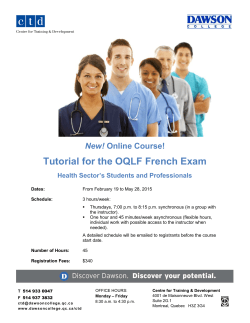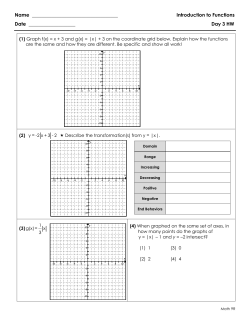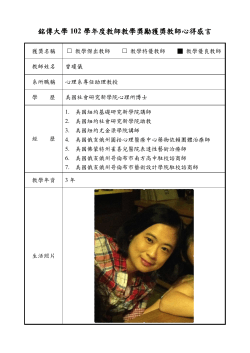
Syllabus - Northwest Florida State College
Student Guide ECO 2013 ECONOMICS I [Distance Learning (online) Format] Northwest Florida State College Mid-term Exam. : March 7, 2015 (8:00 am or, 10:00 am) Final Exam. : May 2, 2015 (8:00 am or, 10:00 am) Both exams will be held at Niceville campus (Room P116) & Look inside for other options (Page 3) Instructor: Dr. Jay Bhattacharya Office: P-122, Niceville Campus Phone: 850-729-5225 E-mail: bhattacj@nwfsc.edu Office Hours : MTWR 8:00-9:30am; MTWR 12:30-1:00pm; MW 6:00- 6:30pm. F 9:00- 10:00am. 2 COURSE OVERVIEW AND REQUIREMENTS Statement of Purpose The purpose of this course is to help students become knowledgeable of basic macroeconomics including concepts, principles, national income accounting, fiscal and monetary policies, banking, policy application, and growth economics. The course will be more enjoyable if you follow the news on the economy and try to apply what you learn. Required Textbook: 1. Macroeconomics by Hubbard and O’Brien, Fourth Edition, Pearson 2. Access code for MyEconLab Course Requirements 1. Complete all assignments (see lesson plans contained in this guide). 2. Students must take a mid-term examination and a final examination. 3. You have to use MyEconLab to complete the assignments. Assignments are posted in MyEconLab. Communicating with Your Teacher At the beginning of the semester you will learn your instructor’s name, telephone number, and office hours. Although there are no requirements for regularly scheduled classes, you should plan to stay in touch with your instructor by phone or e-mail (bhattacj@nwfsc.edu). At any time you need assistance relating to this course, call your instructor or schedule a face-to-face meeting. If you experience difficulty in reaching your instructor, call the Business Division Office at 729-5369. Dr. Jay Bhattacharya: Phone 729-5225, E-mail address bhattacj@nwfsc.edu Grades Your grade for and scale: • • • this course will be determined according to the following percentages Mid-Term examination: 30% Final examination: 30% Homework: 40% 90 - 100 = A; 80 - 89 = B; 70 - 79 = C; 60 - 69 = D; < 60 = F There will be approximately 70 multiple choice questions for each test (midterm and final) and most of the questions will be from your HW assignments. You need to bring a calculator and a #2 pencil for the tests. Cell phone must not be used as a calculator. 3 Exam Options In the first four weeks of classes, students should contact their instructor to confirm their preference for in-person or online proctoring. This preference can be changed by contacting the instructor up to two weeks before the exams. NWFSC Online courses require a proctored element. At NWFSC you have three choices for completing proctored exams: 1) Come to NWFSC campus 2) Use Proctor U 3) Use an approved remote proctor Campus: How do students sign up to complete a proctored exam? Students completing exams at the Niceville Testing Center should be referred to RegisterBlast by visiting the Testing website from NWFSC.edu. (http://www.registerblast.com/nwfsc/exam) What times are the testing centers open? The Niceville Testing Center is open 8:00am – 6:00pm Monday – Thursday and 8:00am – 4:30pm on Friday. Outlying locations’ hours vary. Information is found on the testing website http://www.nwfsc.edu/Students/Enrollment/TestingCenter/ under Hours and Locations. Can students call to make an appointment? Students should be referred to RegisterBlast to make an appointment if testing at the Niceville center. If students desire to complete an exam at a location other than Niceville, they will need to call that particular location to set an appointment. Proctor U: You may take the exam online utilizing Proctor U and pay a fee by credit card. Log in information is available at the following website http://www.proctoru.com/portal/nwfsc/. You must have an internet connection, a webcam, and a valid form of photo ID. To learn more about Proctor U, you may visit the following website: http://www.proctoru.com/howitworks.php. Remote Proctor: You may contact a local College or University in your area and inquire about proctoring services. Base educational offices often provide proctoring services for military students. In most cases a fee is charged. You must provide me with the contact information of such a proctor upon notification and I will reach out to the proctor and let you know if the proctor has been approved. You must notify me at least 3 weeks prior to the exam date (midterm and final) as to how you will have your exam proctored. If you miss the window to notify me of your preference to utilize an Online or Remote Proctoring Service, you will need to show up to take the exam on the Niceville Campus during the advertised time. Otherwise, you will earn a zero for the assignment. In rare cases, a make-up opportunity may be provided. 4 ASSIGNMENTS (For Mid-Term) Chapter 2 – Trade-offs, Comparative Advantage, and Market System 1. Read Chapter 2, giving special attentions to the concepts, graphs and math problems. 2. Complete the assignment on MyEconLab, look for due date. Chapter 3 – Where Prices Come From: The Interaction of Demand & Supply 1. Read Chapter 3, giving special attentions to the concepts, graphs and math problems. 2. Complete the assignment on MyEconLab, look for due date. Chapter 4– Economic Efficiency, Government Price Setting, and Taxes 1. Read Chapter 4, giving special attentions to the concepts, graphs and math problems. 3. Complete the assignment on MyEconLab, look for due date. Chapter 6 – Firms, the Stock Market, and Corporate Governance 1. Read Chapter 6, giving special attentions to the concepts, graphs and math problems. 2. Complete the assignment on MyEconLab, look for due date. Chapter 7 – Comparative Advantage and the Gains from International Trade 1. Read Chapter 7, giving special attentions to the concepts, graphs and math problems. 2. Complete the assignment on MyEconLab, look for due date. Chapter 8 – GDP: Measuring Total Production and Income 1. Read Chapter 8, giving special attentions to the concepts, graphs and math problems. 2. Complete the assignment on MyEconLab, look for due date. Chapter 9 – Unemployment and Inflation 1. Read Chapter 9, giving special attentions to the concepts, graphs and math problems. 2. Complete the assignment on MyEconLab, look for due date. Skip the Appendix of all chapters 5 ASSIGNMENTS (For Final) Chapter 12 – Aggregate Expenditure and Output in the Short Run 1. Read Chapter 12, giving special attentions to the concepts, graphs and math problems. 2. Complete the assignment on MyEconLab, look for due date. Chapter 13 – Aggregate Demand and Aggregate Supply Analysis 1. Read Chapter 13, giving special attentions to the concepts, graphs and math problems. 2. Complete the assignment on MyEconLab, look for due date. Chapter 14 – Money, banks, and the Federal Reserve System 1. Read Chapter 14, giving special attentions to the concepts, graphs and math problems. 2. Complete the assignment on MyEconLab, look for due date. Chapter 15 – Monetary Policy 1. Read Chapter 15, giving special attentions to the concepts, graphs and math problems. 2. Complete the assignment on MyEconLab, look for due date. Chapter 16 – Fiscal Policy 1. Read Chapter 16, giving special attentions to the concepts, graphs and math problems. 2. Complete the assignment on MyEconLab, look for due date. Chapter 17 – Inflation, Unemployment, and Federal Reserve Policy 1. Read Chapter 17, giving special attentions to the concepts, graphs and math problems. 2. Complete the assignment on MyEconLab, look for due date. Skip the Appendix of all chapters 6 How to Access your Homework To access your homework on MyEconLab, go to http://ecampus.nwfsc.edu and click on “My D2L Classroom” Log into with your college username and password Click on the Economics course you are enrolled in Click the link for MyEconLab in the middle of the screen If you have problems accessing D2L go to: http://ltech.nwfsc.edu/forms.strudenthelpform.html and complete the request form. 7 Student Registration Instructions To register for Eco2013, #92939/Spring 2015/DL: 1. Go to pearsonmylabandmastering.com. 2. Under Register, click Student. 3. Enter your instructor’s course ID: bhattacharya30705, and click Continue. 4. Sign in with an existing Pearson account or create an account: · If you have used a Pearson website (for example, MyITLab, Mastering, MyMathLab, or MyPsychLab), enter your Pearson username and password. Click Sign in. · If you do not have a Pearson account, click Create. Write down your new Pearson username and password to help you remember them. 5. Select an option to access your instructor’s online course: · Use the access code that came with your textbook or that you purchased separately from the bookstore. · Buy access using a credit card or PayPal. · If available, get 14 days of temporary access. (Look for a link near the bottom of the page.) 6. Click Go To Your Course on the Confirmation page. Under MyLab & Mastering New Design on the left, click Eco2013, #92939/Spring 2015/DL to start your work. Retaking or continuing a course? If you are retaking this course or enrolling in another course with the same book, be sure to use your existing Pearson username and password. You will not need to pay again. To sign in later: 1. Go to pearsonmylabandmastering.com. 2. Click Sign in. 3. Enter your Pearson account username and password. Click Sign in. 8 4. Under MyLab & Mastering New Design on the left, click Eco2013, #92939/Spring 2015/DL to start your work. How to Succeed at Distance Learning Read to Learn • Examine the book. Develop a “feel” for the book before studying it. Read through the table of contents, the preface, introduction and/or forward. Glance through the index, bibliography, glossary, and any illustrations and diagrams the book may contain. • Ask questions. Frame questions about the text to help you better understand the subject. Consider the questions given either at the beginning or the end of the chapter before reading the chapter. • Be an active reader. 1) Highlight important or key phrases and words. 2) Use margins for writing questions or comments. 3) Make notes on major concepts or points. • Read it aloud. When you’ve finished reading the chapter, go back once more and read out loud the material you highlighted, along with the notes you made in the margins and the notes made on major concepts. • Review. Give the highlighted material and your notes one final read. How to Prepare for an Exam • • • Prepare for the test. Review the material you have studied. Pay careful attention to the points you’ve highlighted. Invest the time that’s really required to review the information until you’re as knowledgeable about the subject matter as possible. Know the test. The format of the test is important, because it directly relates to your ability to provide correct answers. o Your physical preparation. Get plenty of rest during the week prior to the test. Set a reasonable study schedule and keep it. Get enough sleep the night before the test, and arrive at the test site early to give yourself time to relax in an otherwise tense environment. Taking the examination. Follow these simple procedures: 1) Read all instructions carefully and follow them precisely. 2) Quickly review the entire test, noting the relatively easy and difficult parts. 3) Unless you’re directed to answer the questions in order of their appearance, answer the easier questions first. 4) Read each question twice to be sure you completely understand it before answering. 5) Write legibly. 6) Try to leave enough time to review your answers. Scheduling Your Study Time Gaining control of your time is the most important thing you can do to establish a successful study schedule. • Identify exactly what you are now doing with your time. It may help to keep a log for a short period of time. Prepare a list of the major activities that make up your day. Prepare a chart for each day of the week, identify those portions of your day that can be sacrificed to your study schedule. • Dictate study material and play it on the car tape player as you drive. Check the local library to see if any of the assigned books have been recorded on audiotape. • You can accommodate additional study time during your hour. 9 • Between the time the children go to bed and the time you retire, there are three hours of what should be relative calm in which to study. When planning your study schedule, you should follow several rules: • • • • Don’t overdo it. Don’t plan your study time unrealistically. Plan for the times likely to be most productive. Distance learning studying is an individual activity. Plan your study schedule around those times you can be alone. Don’t time-share study periods. Few people can study and listen to music or watch television at the same time. Start with short study periods. Discipline yourself to develop the habit of studying and learning can be similar to beginning an exercise program. When you have fully prepared your study schedule plan, make a concerted effort to live up to it. A good study schedule will provide you with the proper environment and frame of mind for successful distance learning study. Student Responsibilities & Rights: Students are responsible for adherence to all college policies and procedures, including those related to academic freedom, cheating, classroom conduct, computer/network/e- mail use and other items included in the NWFSC Catalog and Student Handbook. Students should be familiar with the rights and responsibilities detailed in the current NWFSC Catalog and Student Handbook. Plagiarism, cheating or any other form of academic dishonesty is a serious breach of student responsibilities and may trigger consequences which range from a failing grade to formal disciplinary action. Accommodations for Students with Disabilities: If you have a disability for which accommodations may be appropriate to assist you in this class, please contact the Office of Disability Support Services in the Student Services Center on the Niceville Campus. The counselor for Students with Disabilities may be reached by calling 729-6079 (TDD 1-800-955-8771 or Voice 1-800-955-8770) or by email at smithe15@nwfsc.edu Classroom Policies: 1. Cell Phone/Electronic Communication Devices: Cell phones, pagers and other such electronic devices must be turned off during class and lab time. Communication by electronic devices, including but not limited to instant messaging, text messaging, and telephone, during class is strictly prohibited unless expressly designated as part of the learning activities. Use of electronic communication devices during examinations or other graded activities may constitute grounds for disciplinary action. Where emergency or employment situations require access to electronic communication services, arrangements may be made in advance with the instructor. In certain circumstances, (e.g., exams, presentations, etc.), students may be required to temporarily deposit cell phones or other communications devices with the instructor for the duration of the specific class or activity. 2. Violating this Cell Phone/Electronic Communication Devices policy during any exam will result in a 10-point reduction in your exam grade. 3. You need to bring a calculator and a #2 pencil for the tests. Cell phone must not be used as a calculator and you cannot share a calculator. 10 4. An incomplete grade (“I”) may be awarded when the student is unable to finish the required work because of unforeseen extenuating circumstances such as illness or TDY assignment. To receive an “I” grade, the student must have successfully completed a significant portion (e.g., all work completed except final exam) of the required coursework and be able to finish the remaining work without attending class. An “I” grade will automatically convert to a grade of “F” if the student does not complete the remainder of the coursework by the established deadline. Emergency Disclaimer In the event of unusual or extraordinary circumstances, the schedule, requirements, and procedures in this course are subject to change. In such cases, students will be provided with written notice sufficient to plan for and accommodate the changes. If changes to graded activities are required, students will not be penalized as a result of the adjustments, but will be responsible for meeting revised deadlines and course requirements Contact Your Fellow Students: At the start of any class, it is a good strategy to find two or three other students to exchange e-mail addresses and/or phone numbers so that you will have someone to contact if you miss a class, have questions about an assignment/class notes, or just want to visit with someone else who is going through the same challenges that you are!
© Copyright 2025








